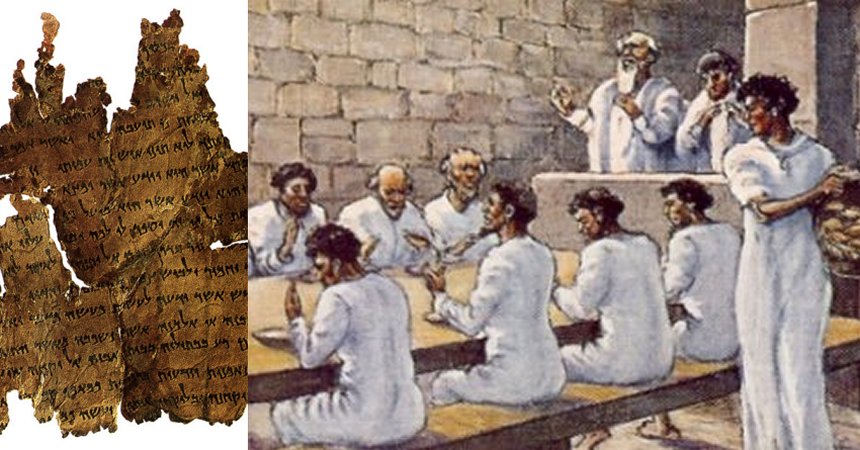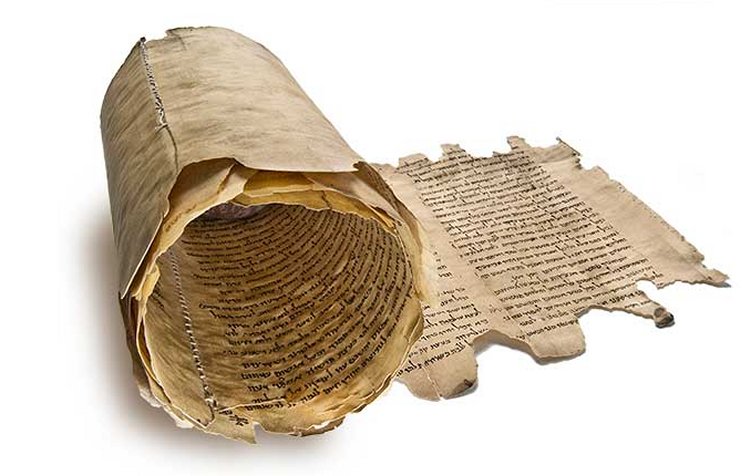Strange Community Rules Of Essenes Preserved In The Dead Sea Scrolls
Jan Bartek - AncientPages.com - Originally known as the Manual of Discipline, the community rules were written during a time when there was political instability in the region and the goal was the create a strong community consisting of very loyal members.
Still, we cannot deny that some of the rules were very strange and a member could be punished for the behavior we today consider quite normal.
The Damascus Document Scroll, 4Q271Df, found in Cave 4. Credit: Public Domain - Right: An ancient sect of the Essenes at the meal table, Qumran. Credit: NCCG
In West Jordan in 1947, near the ruins of Qumran - also known as Khirbet Qumran - clay pots filled with ancient scrolls were found stored in eleven caves, located 13 miles east of Jerusalem, Israel. These ancient manuscripts are today known as the Dead Sea scrolls.
“The texts are written using a carbon-based ink and are mostly in Hebrew, with some in Aramaic (a Semitic language, allegedly spoken by Jesus) and in Greek.
Preliminary analysis showed the texts belonged to the Essenes, members of a religious sect, or brotherhood that flourished in Palestine from about the 2nd century BC to the end of the 1st century AD.
However, a later review of these results has raised additional questions related to the scrolls, considered one of the greatest archaeological events of the twentieth century.
Still not much is known about the Dead Sea Scrolls and the place where they were discovered. There are also many controversies.
One of these issues is for example, who wrote the Dead Sea Scrolls and then hid them away in the caves around Qumran. Some scholars believe that the Essenes were not responsible for the Dead Sea Scrolls at all, but the manuscripts were written by priests of Jerusalem's Second Hebrew Temple and later transported to Qumran and safely hidden from the Romans.
But also, this theory has many opponents.
Was the Vatican behind a plot to suppress the release of the scrolls to the public out of fear that they contained the dangerous material related to early Christianity?” 1
What Can We Learn From The Community Rules?
Wherever we hear loud laughter we automatically see this as a sign of happiness. Granted that laughter can occasionally be inappropriate, but it’s hardly behavior that should be punished, at least not in our modern society, but ancient people were of a different opinion.
According to the community rules of the Dead Sea Scrolls, loud laughter was forbidden among the Essenes, who are generally recognized as the authors of the Dead Sea Scrolls. The community rules reveal a person could be punished and banished from the community for “breaking the social harmony”.
The sect divided humanity between the righteous and the wicked and asserted that human nature and everything that happens in the world is irrevocably predestined.
“The Rule of the Community (1QS), from the Dead Sea Scrolls, sets forth the beliefs and activities of a community of pious sectaries at Qumran in the desert just before the Christian era—what Professor Frank Cross has called a sect (church) of “anticipation.”
Everything is by way of preparation “for the eternal planting of a holy temple for Israel, and the mysteries (secret ordinances) of a holy of holies for Aaron” (1QS VIII, 5–6). Preparation is the theme; hence, it is not surprising that the specific ordinances referred to are the initiatory rites.
But at the same time, the scroll makes clear the ultimate objective of its whole operation—exaltation and eternal lives for the members—while plainly indicating the general nature of the temple activities to which it looks forward with such eager anticipation.
The facsimile of the Manual of Discipline. Credits: Facsimile Editions
The whole theme of religion is eternal life. But beings who would live forever must be prepared to do so—they must be perfect. Nothing but perfection will do for an order of existence that is to last forever and ever.
The striving for perfection is the theme of the Rule of the Community. The sectaries of Qumran knew that the greatest of all prizes were not to be cheaply bought, that there could be no cheating or cutting of corners; to prepare for eternity, one must be willing to go all the way.” 2
The strict rules were meant to prevent negative emotions as well as rivalry and conflicts. Some of the community rules were peculiar or almost a bit funny. For example, you could be punished for falling asleep during a meeting, laughing loud, lying, or speaking rudely.
People who were impatient or sought revenge were also regarded as unwanted members of the community.
If you broke one of the community rules, you could be prohibited from participating in the sect’s activities, like common meals and meetings. If the “crime” was considered severe enough, or someone broke the rules on a regular basis, the member could be expelled from the community.
Written by Jan Bartek - AncientPages.com Staff Writer
Copyright © AncientPages.com All rights reserved. This material may not be published, broadcast, rewritten or redistributed in whole or part without the express written permission of AncientPages.com
Expand for references- Sutherland - Qumran: The Dead Sea Scrolls And Their Connection To Enigmatic Essenes
- Hugh Nibley, From the Dead Sea Scrolls - Studies in the Bible and Antiquity, Vol. 2
Hempel, Charlotte. "Interpretative Authority in the Community Rule Tradition." Dead Sea Discoveries 10, no. 1 (2003): 59-80. Accessed May 17, 2020.
More From Ancient Pages
-
 Camas Plant Stewardship In The Pacific Northwest Dates Back More Than 3,500 Years
Archaeology | May 23, 2024
Camas Plant Stewardship In The Pacific Northwest Dates Back More Than 3,500 Years
Archaeology | May 23, 2024 -
 2,000-Year-Old Roman Sandal With Nails Found In Germany
Archaeology | Jun 28, 2024
2,000-Year-Old Roman Sandal With Nails Found In Germany
Archaeology | Jun 28, 2024 -
 Incredible Ancient Extinct World Of Unknown Organisms Discovered
Evolution | Jun 8, 2023
Incredible Ancient Extinct World Of Unknown Organisms Discovered
Evolution | Jun 8, 2023 -
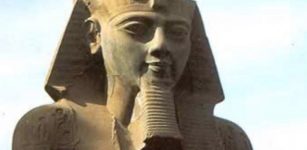 Colossus of Ramesess II At Karnak Temples Is Undergoing Restoration
Archaeology | Feb 24, 2017
Colossus of Ramesess II At Karnak Temples Is Undergoing Restoration
Archaeology | Feb 24, 2017 -
 200-Year-Old Message In A Bottle Written By Archaeologist Unearthed In France
Archaeology | Sep 30, 2024
200-Year-Old Message In A Bottle Written By Archaeologist Unearthed In France
Archaeology | Sep 30, 2024 -
 Underwater Artifacts Shed New Light On Battle Of The Egadi Islands Between Romans And Carthage
Archaeology | Dec 16, 2020
Underwater Artifacts Shed New Light On Battle Of The Egadi Islands Between Romans And Carthage
Archaeology | Dec 16, 2020 -
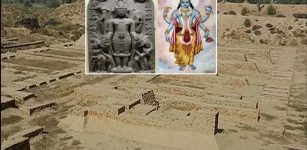 Temple Of Lord Vishnu Dated To Hindu Shahi Dynasty Unearthed In Pakistan
Archaeology | Nov 22, 2020
Temple Of Lord Vishnu Dated To Hindu Shahi Dynasty Unearthed In Pakistan
Archaeology | Nov 22, 2020 -
 On This Day In History: Mysterious Death Of White Queen Anne Neville – On Mar 16, 1485
News | Mar 16, 2017
On This Day In History: Mysterious Death Of White Queen Anne Neville – On Mar 16, 1485
News | Mar 16, 2017 -
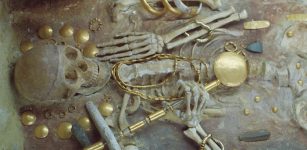 Archaeology Sheds Light On Why Some Ancient Societies Were More Unequal Than Others
Featured Stories | May 25, 2022
Archaeology Sheds Light On Why Some Ancient Societies Were More Unequal Than Others
Featured Stories | May 25, 2022 -
 Explorer Discovered A Lost Underground World Beneath Big Sur In North America – But Why Cannot Anyone Else Find It Now?
Ancient Mysteries | Feb 12, 2019
Explorer Discovered A Lost Underground World Beneath Big Sur In North America – But Why Cannot Anyone Else Find It Now?
Ancient Mysteries | Feb 12, 2019 -
 Great Easter Traditions Passed Down Over Centuries And Widely Practiced
Ancient History Facts | Mar 25, 2016
Great Easter Traditions Passed Down Over Centuries And Widely Practiced
Ancient History Facts | Mar 25, 2016 -
 Diyu – Terrible Chinese Hell And Judgement Of God Yama
Chinese Mythology | Dec 18, 2018
Diyu – Terrible Chinese Hell And Judgement Of God Yama
Chinese Mythology | Dec 18, 2018 -
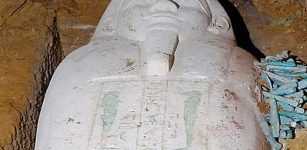 Limestone Sarcophagus, Ushabti Figures Unearthed In Minya’s Al-Gharafa Area, Egypt
Archaeology | Oct 3, 2020
Limestone Sarcophagus, Ushabti Figures Unearthed In Minya’s Al-Gharafa Area, Egypt
Archaeology | Oct 3, 2020 -
 Why Human Languages Can Be Likened To Branches On A Tree And Help Finding A Single Common Ancestor
Linguistic Discoveries | Sep 11, 2021
Why Human Languages Can Be Likened To Branches On A Tree And Help Finding A Single Common Ancestor
Linguistic Discoveries | Sep 11, 2021 -
 Baltinglass Hills: Prehistoric Irish Monuments May Have Served As Pathways For The Deceased – New Evidence
News | Apr 30, 2024
Baltinglass Hills: Prehistoric Irish Monuments May Have Served As Pathways For The Deceased – New Evidence
News | Apr 30, 2024 -
 Teaching Is Not Essential For People To Learn How To Make Tools, Study Says
Archaeology | Dec 6, 2015
Teaching Is Not Essential For People To Learn How To Make Tools, Study Says
Archaeology | Dec 6, 2015 -
 Decebalus – The Brave One’ – Last Mighty King Of Dacian People
Featured Stories | Jun 23, 2022
Decebalus – The Brave One’ – Last Mighty King Of Dacian People
Featured Stories | Jun 23, 2022 -
 Unexpected Underwater Discovery Of 50,000 Ancient Coins Off Sardinia Hints At Hidden Shipwreck
Archaeology | Nov 10, 2023
Unexpected Underwater Discovery Of 50,000 Ancient Coins Off Sardinia Hints At Hidden Shipwreck
Archaeology | Nov 10, 2023 -
 Why Were Wampum Belts Important To Native Americans?
Featured Stories | May 10, 2018
Why Were Wampum Belts Important To Native Americans?
Featured Stories | May 10, 2018 -
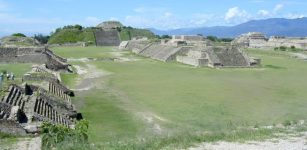 Ancient Mexican City Endured For Centuries Without Extremes In Wealth And Power
Archaeology | Mar 8, 2022
Ancient Mexican City Endured For Centuries Without Extremes In Wealth And Power
Archaeology | Mar 8, 2022

